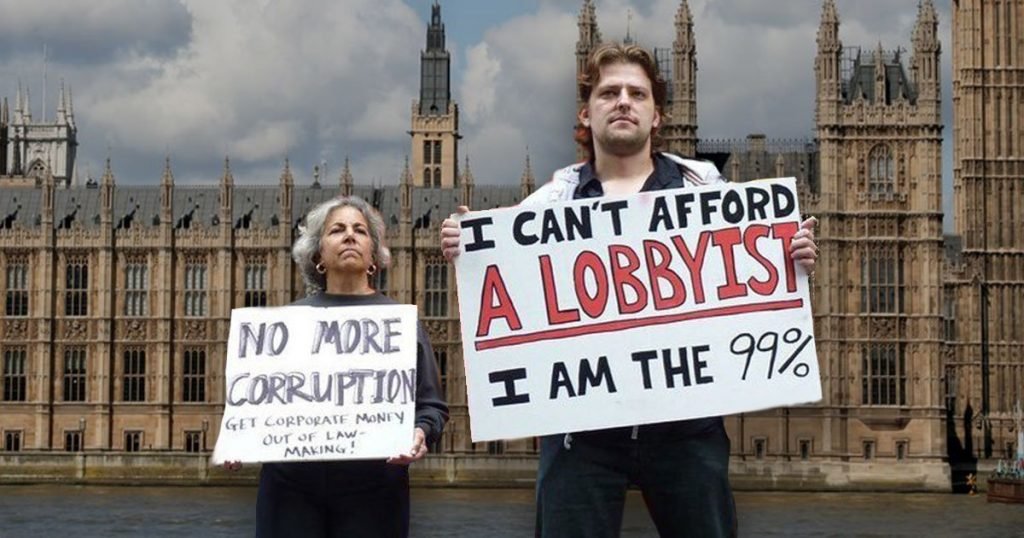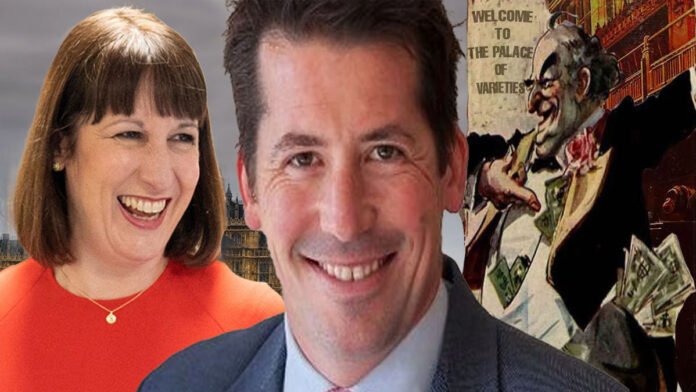Cronyism: The Corfield Controversy
When Labour swept to power, many hoped for a departure from the cronyism that had become synonymous with Tory rule. Alas, it seems the more things change, the more they stay the same.
The recent appointment of Ian Corfield to a top Treasury role serves as a stark reminder that the revolving door between politics and finance continues to spin, regardless of which party holds the keys to Number 10.
Corfield, a former banker and senior Labour Party adviser, donated over £20,000 to Labour politicians, including now-Chancellor Rachel Reeves, in the run-up to the general election. His subsequent appointment as director of investment at the Treasury – a position typically reserved for career civil servants and potentially commanding a salary of up to £162,500 – raises serious questions about the integrity of the civil service recruitment process.
He is understood to be on a fixed term contract for what a source described as a “very limited” period of time. His social media profile suggests it began in July. It is not clear when the contract ends.
The most alarming aspect of this affair is the apparent failure to disclose Corfield’s political donations to the Civil Service Commission (CSC) when seeking approval for his appointment. This omission strikes at the heart of the impartiality that should be the hallmark of our civil service. The CSC’s role in independently considering departmental requests under its principles is rendered meaningless if crucial information about a candidate’s political affiliations is withheld.
Conservative shadow Treasury chief secretary Laura Trott has described the appointment as “hypocrisy off the scale” from Labour and has demanded to know whether the chancellor was involved in it.
In opposition, Labour frequently accused the Conservatives of “cronyism” in appointing their political friends to public bodies.
Laura Trott, who was chief secretary to the Treasury until Labour’s landslide victory in last month’s general election, has written to Reeves and Bowler demanding answers about the hiring of Ian Corfield as director of investment.
Among the Sevenoaks and Swanley MP’s questions are whether Corfield’s financial gifts to the Labour Party were detailed to appointments watchdog the Civil Service Commission, which approved the non-competitive recruitment process.
Last week, the CSC said it had approved his temporary appointment “recognising the need for the civil service to quickly bring in relevant skills for a fixed term”. “All appointments by exception are reminded of their responsibilities under the civil service code to act with impartiality, objectivity, integrity and honesty,” it said.
Yesterday, the Politico website reported that two people “familiar with the appointment process” had told it the CSC was not made aware of Corfield’s history as a Labour Party donor.
In a blog published earlier this week, CSC interim chief executive Kate Owen said decisions to approve an appointment by exception involve consideration of a departmental business case explaining why the role cannot be done by existing staff or filled through open competition.
She added: “The department – as the employer – is responsible for carrying out background checks on individuals who may be appointed by exception. The department is also responsible for addressing any potential propriety matters.”
While the Treasury hides behind the shield of not commenting on individual staffing appointments, the public deserves transparency. The refusal to confirm whether Corfield’s donations were declared to James Bowler, the department’s most senior civil servant responsible for propriety, only deepens suspicions of impropriety.
This case exposes glaring gaps in the rules governing civil service appointments. As Jack Worlidge of the Institute for Government points out, the Commission’s recruitment principles are silent on the use of exceptions to appoint politically aligned candidates. This loophole allows for the potential abuse of a process intended for exceptional cases where external talent is genuinely needed.
According to his LinkedIn profile, external, Mr Corfield previously provided business advice to the Labour Party for seven months, and before that held senior roles in financial services. Until recently, he was also a director of Labour-supporting news website LabourList.
He was appointed as director of investment at the Treasury without going through the usual application process. This is allowed when the commission is satisfied a fair and open competition is not feasible, for example, because of an urgent need to recruit or a role’s short duration.
So-called “exceptions” to the normal rules have been granted more than 100 times in the past 12 months.
A commission spokesperson said: “This temporary appointment was approved by the Commission, recognising the need for the Civil Service to quickly bring in relevant skills for a fixed term.
“All appointments by exception are reminded of their responsibilities under the Civil Service Code, external to act with impartiality, objectivity, integrity and honesty.”
Of course, there are no rules automatically preventing someone from being appointed to a civil service role because of their political donations but it does bring into play impartiality.
Labour’s Hypocrisy on Full Display

The appointment of Oliver Newton, who ran Reeves’ business engagement operations while in opposition, as her head of business engagement at the Treasury further underscores the blurring of lines between political allegiance and civil service impartiality. While engaging with business is crucial for economic growth, the method of appointment and the close political ties involved raise legitimate concerns about potential conflicts of interest.
Labour’s pre-election emphasis on propriety and ethics now rings hollow. The promise of an Ethics and Integrity Commission seems like a distant memory in light of these appointments. If Labour is serious about cleaning up politics, it must start by addressing these glaring inconsistencies in its own conduct.
The civil service’s strict impartiality rules exist for a reason – to prevent even the perception of bias or conflict of interest. By circumventing these rules, or at least pushing them to their limits, the Labour government risks undermining public trust in our institutions. The argument that exceptions are needed to bring in external talent holds water only if that talent is truly exceptional and politically neutral. When the individuals in question have clear and recent political ties, the justification becomes much harder to swallow.
From Promises to Practices: Failing the People

This is not merely about following rules for rules’ sake. A truly impartial civil service is essential for good governance. It provides continuity and expertise across changes in government, offers honest and unbiased advice to ministers, and serves as a bulwark against the politicisation of public administration. When that impartiality is compromised, even in appearance, it erodes public confidence in the entire system of government.
Moreover, this incident is symptomatic of a broader issue in British politics – the revolving door between government, business, and finance. This cosy relationship often leads to policies that favour the well-connected at the expense of the general public. It’s a practice that Labour rightly criticized while in opposition, making their apparent embrace of it in government all the more disappointing.
The irony is palpable. A party that rode to power on promises of change and integrity now seems to be falling into the same patterns of behaviour they once decried. It’s a stark reminder that the allure of power and the temptation to reward allies are not confined to any one political party.
As we witness this unfolding drama, we must ask ourselves: Is this the change we were promised, or just another bait-and-switch in the grand circus of British politics? It seems we’ve traded blue rosettes for red ones, but the stench of cronyism remains as pungent as ever. The Labour Party, in their infinite wisdom, appears to have misunderstood their mandate. They weren’t elected to simply warm the seats left by the Tories, but to fumigate the entire rotten establishment. Yet here we are, watching them settle in like it’s a cosy inheritance rather than a promise of change, the slogan they were elected on.
The onus is now squarely on Labour to prove they’re more than just Tories in disguise. Their lofty promises of integrity and ethical governance are starting to sound like a bad joke. It’s high time they address these appointments head-on, with full transparency – though I won’t hold my breath waiting for that miracle. They need to implement safeguards so robust they’d make the Tower of London look like a garden shed. Anything less, and they might as well admit they’re just another bunch of wolves in sheep’s clothing.
At the end of the day we have to resign ourselves to the fact, no one’s draining the swamp; they’re just adding red dye to make it look different. Labour, it appears, has succumbed to the age-old temptation of power faster than you can say “business as usual.” They’ve gone from promising to clean house to redecorating it with their own brand of muck. Meet the new boss, indeed – same as the old boss, just with a red tie and a more progressive Twitter bio.
Support Independent Journalism Today
Our unwavering dedication is to provide you with unbiased news, diverse perspectives, and insightful opinions. We're on a mission to ensure that those in positions of power are held accountable for their actions, but we can't do it alone. Labour Heartlands is primarily funded by me, Paul Knaggs, and by the generous contributions of readers like you. Your donations keep us going and help us uphold the principles of independent journalism. Join us in our quest for truth, transparency, and accountability – donate today and be a part of our mission!
Like everyone else, we're facing challenges, and we need your help to stay online and continue providing crucial journalism. Every contribution, no matter how small, goes a long way in helping us thrive. By becoming one of our donors, you become a vital part of our mission to uncover the truth and uphold the values of democracy.
While we maintain our independence from political affiliations, we stand united against corruption, injustice, and the erosion of free speech, truth, and democracy. We believe in the power of accurate information in a democracy, and we consider facts non-negotiable.
Your support, no matter the amount, can make a significant impact. Together, we can make a difference and continue our journey toward a more informed and just society.
Thank you for supporting Labour Heartlands












